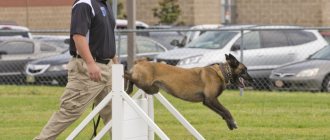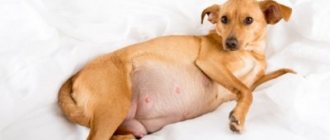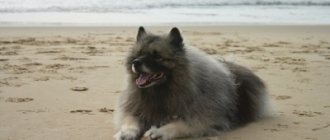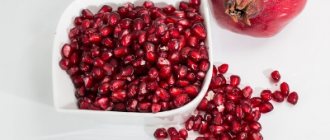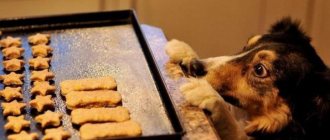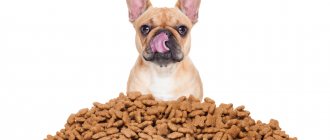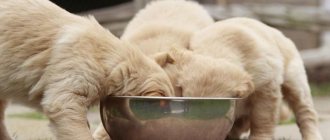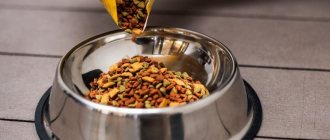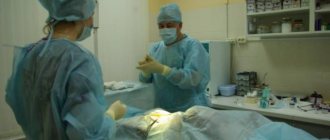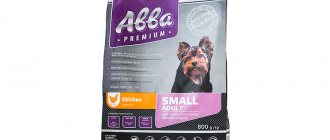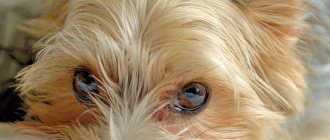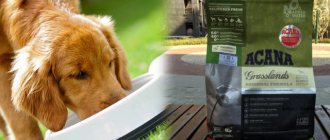Toy terriers are popular miniature dogs all over the world with a cheerful disposition, love of life and incredible devotion to their owner.
Miniature size is both an advantage and a disadvantage of representatives of this breed, because Their modest dimensions make them very fragile.
Improper nutrition can lead to the development of dangerous pathologies.
That is why an important component of caring for a toy terrier is a well-formulated diet for the pet.
The age of the pet should also be taken into account.
Natural food or artificial food?
Toy Terriers are miniature dogs that require little food. At the same time, small portions should contain everything necessary for the healthy growth and development of the puppy.
It is important to maintain a balance of proteins, fats, vitamins, carbohydrates, fiber, fatty acids and minerals.
At home, representatives of this breed can be fed with both natural products and industrial feeds, the main thing is to avoid mixing both types of food.
The advantage of natural feeding is its diversity, the absence of flavors, dyes and other chemical additives.
Ready-made food, in turn, is popular due to its ease of use and balanced composition, containing everything necessary for the harmonious development of a dog..
Expert opinion
Kozhevin Semyon Kirillovich
Expert dog handler.
Most professional breeders opt for ready-made food, since this type of feeding is as simple as possible and does not have a negative effect on the dog’s body. After purchasing a puppy, the new owner can switch it to natural food. At the same time, it is necessary to understand that feeding natural products does not mean that the pet can eat food from the common table - for the dog you will need to cook separately and every day. If you don’t have confidence in your own abilities regarding daily cooking and creating a balanced menu, it is better to opt for high-quality food, since experiments with nutrition will have a negative impact on your pet’s health.
General recommendations for healthy eating
The quality of feeding of a toy terrier determines its development, health and coat.
In addition to the fact that nutrition should be complete and balanced, you should adhere to the following rules:
- feeding should take place at the same time every day;
- Clean drinking water should always be freely available;
- food should be at room temperature or slightly warmer;
- treats and treats should only be given during main meals;
- It is forbidden to feed the dog from the common table;
- food should be prepared from fresh, high-quality products without adding spices or salt;
- If there is food left in the bowl after a meal, the portion should be reduced; if there is not enough food, increase it.
You can judge whether your pet is feeding correctly by its appearance.
A healthy Toy Terrier should have a shiny coat, clear eyes, a normal appetite and regular bowel movements . If there are any negative changes in behavior or appearance, you should contact your veterinarian.
Features of the diet and composition
The main thing that a toy owner must know is how to balance a dog’s diet that is suitable for age, gender and other factors. The general rules are the same for all terriers.
There should always be clean water in your pet's bowl, and it is better to feed him on a schedule at the same time.
When your pet does not eat enough food from the bowl, it is not recommended to insist on emptying it. The best option would be to offer the dog a smaller amount of food next time.
Expert opinion
Anna Abramenko
An avid dog lover. Experience in veterinary medicine since 2009.
Ask a Question
Toy terriers are not allowed to feast on their master's table. Sausages, fatty meats, and peppery dishes are contraindicated for small dogs.
For toy terrier puppies
Newborn toys feed on mother's milk. Their diet is changed at one month of age.
Dogs from 1-2 months of age are given food for toy terrier puppies 6 to 8 times a day. During this period, small dogs learn to drink from a bowl themselves. You need to offer meat products, cottage cheese, and add egg yolks to food. Such nutrition develops the bone skeleton and strengthens the teeth of the toy terrier.
This is interesting: 7 vaccinations that a Toy puppy needs to get up to 3 months
At 2-3 months, dogs eat 5-6 times a day, at 3-4 months – 4 times a day.
For an adult dog
One-year-old adult dogs are usually fed once or twice a day. The food is similar to that for children. Toy terriers should not be given salty or peppery ingredients.
The main components of the diet are meat and fish products, egg yolks, and cereals. You need to make sure that the temperature of the dog's food in the bowl is warm. The serving size is determined based on the age of the terrier.
For a nursing bitch
After giving birth, the animal’s body is exhausted, so special nutrition is recommended for dogs. The mother is fed 6 times a day.
Expert opinion
Anna Abramenko
An avid dog lover. Experience in veterinary medicine since 2009.
Ask a Question
A week and a half after giving birth, the female toy terrier is given only dairy products, then vegetables, fruits, meat and offal are included in the diet.
To normalize the vitamin and mineral balance in the body after delivery, mother's milk is enriched by giving the dog calcium supplements and lightly salted food.
When feeding, the bitch shares nutrients with the puppies. 10% cream will help replenish the fat balance. Other liquids suitable for the toy terrier include rice broth and water. When the puppies are separated from their mother, the bitch is given 3 meals a day.
Pros and cons of natural food
A natural diet, in addition to the absence of harmful chemical additives, has a number of advantages:
- the owner has the opportunity to independently choose products for the pet based on their quality and freshness;
- such food is better digestible, and all the substances necessary for a dog’s health are of natural origin;
- in case of an allergy to one of the products on the menu, it can be replaced with a similar content of macro- and microelements, avoiding a complete change of diet.
In addition, natural food is varied and minimizes the likelihood that the dog will become bored with food.
There are some disadvantages to this type of feeding.:
- it will not be possible to prepare food for future use - stale food loses all its useful components, and in some cases can cause poisoning;
- additional intake of vitamins and minerals is necessary;
- a balanced menu cannot be compiled without certain knowledge.
This diet is also inconvenient for people who often travel with their pet..
Authorized Products
The natural diet of toy terriers should be based on animal protein: raw (pre-frozen or processed with boiling water) or boiled meat, offal or fish.
Beef, turkey, veal, chicken, and sea fish are suitable for representatives of this breed..
Of course, the menu cannot contain only meat - a diet that consists of consuming only this product does not provide the dog with all the necessary substances and contributes to constipation, calcium leaching and other health problems.
The toy terrier's diet should include:
- buckwheat, rice or oatmeal;
- offal - kidneys, heart, liver, tripe;
- vegetables – carrots, zucchini, red bell pepper, pumpkin, broccoli;
- berries and fruits - pears, apples, blueberries, strawberries, watermelon, melon;
- fermented milk products - cottage cheese, kefir, fermented baked milk.
You should also give your pet:
- fresh herbs - dill, parsley;
- raw or boiled yolk - every 3-4 days;
- honey – maximum 1 time per week;
- sunflower or olive oil - twice a week, 1-2 drops.
From time to time you can give your dog a small amount of seeds, unsalted nuts, brown bread crackers.
What is strictly contraindicated
It is forbidden to include toy terriers in the diet:
- pork and other fatty meats;
- sausages and smoked products;
- river fish;
- seasonings;
- cream;
- sour cream;
- raw eggs;
- boiled potatoes;
- legumes;
- sweets;
- pickles and marinades;
- pasta and bakery products;
- Tea coffee;
- citrus;
- alcohol;
- raisins, grapes;
- tubular bones.
Consumption of these products can lead to poisoning, allergic reactions and other health problems..
Industrial feed
Feeding prepared industrial feeds also has a number of advantages and disadvantages.
Advantages of this type of nutrition:
- the special composition with which dry food granules are coated helps prevent dental diseases, eliminating plaque and tartar;
- you can control the amount of calories consumed;
- ease of storage and use;
- hygiene;
- constant balanced composition;
- the opportunity to choose the appropriate food based on the age, size, lifestyle and level of physical activity of the pet.
IMPORTANT!
To avoid developing urolithiasis, your dog should always have access to clean drinking water.
The disadvantages of ready-made feeds include their high cost, if we are talking about high-quality products from well-known brands.
Economy class food is not suitable for feeding toy terriers due to the content of meat waste, grains, flavorings, dyes and flavor enhancers..
In addition to dry food, wet food is also available on the modern market - they contain up to 80% liquid, which has a positive effect on the pet’s gastrointestinal tract, but reduces its nutritional value and shortens shelf life.
Ready-made feeds, depending on the composition, can be of different classes:
- economy - practically do not contain meat, and a small amount of it is of low quality, possibly containing soy, dyes, flavor enhancers, legumes, preservatives;
- premium – it contains meat and vegetables, but is not enriched with vitamins and minerals;
- super-premium - such foods contain the necessary amount of natural antioxidants, herbs, probiotics, vitamins, they are made from high-quality meat and offal.
Each brand also has separate lines of hypoallergenic food and holistic food - products containing several types of meat, vegetables, fruits, digestive enzymes, pre- and probiotics, vitamins and minerals.
Dry food
Only high-class products are suitable for feeding toy terriers - not lower than premium.
When choosing food for your pet, you need to focus on the labels on the packaging (Mini or Small) and the composition: in the first place in the list of ingredients, the source of animal protein should be indicated in an amount of at least 40-50%, then fruits and vegetables or products containing fiber .
High-quality dry food should include::
- at least 5 sources of carbohydrates;
- at least 2 sources of protein;
- at least 3 types of fruits and vegetables;
- enzymes, probiotics, vitamins and minerals.
List of the most suitable food for representatives of this breed:
- Purina;
- Hills;
- Orijen;
- Pet Nutrition;
- Acana;
- Grandorf;
- Monge;
- Royal Canin.
It is necessary to select food individually for each dog - what suits one toy terrier well may not suit another.
General information about vitamins for toy terriers.
Vitamin supplements are included in the finished feed. Do not under any circumstances mix vitamin-enriching supplements and mineral components into dry industrial dog food granules. Otherwise, you risk rewarding your pet with hypervitaminosis with subsequent metabolic disorders. However, if your puppy is developmentally delayed or has abnormal development (weight and height), consult your veterinarian. And here there are two options: either the dog doctor will advise you to change food, or will prescribe a fortifying course of treatment.
Now let's talk about vitamins for the terrier who is fed homemade food. These dogs should be given the necessary microelements in their diet at least twice a year. During the transition of the season from autumn to winter and early spring.
The enzymes and energy molecules that are responsible for metabolic reactions in the toy terrier’s body will not cope with this process if there is a lack of trace elements. The lack of life-sustaining supplements (“vitae” - from Greek life) leads first to symptoms of general pathology (weakness, decreased activity, loss of appetite, etc.), and then to specific veterinary problems with the health of the animal.
Again, it is better to entrust the selection of the optimal complex to a veterinarian. If you don’t have such specialists in your town, then, based on the experience of breeders, we present the most suitable supplements for toy terriers.
Feeding the puppy
The number of feedings and the products necessary for the development of a toy terrier depend on its age..
1 month
At this age, puppies need to be fed 6 times a day.
In the first 3 weeks after birth, the puppy eats only mother's milk, then it is necessary to gradually introduce complementary foods consisting of warm cow's or goat's milk.
When the puppy is 1.5 months old, you can begin to wean him from his mother and introduce finely chopped boiled beef, baby cottage cheese, oatmeal, buckwheat, and rice porridge into his diet.
All products must be added gradually, observing the puppy’s reaction.
2 months
The number of feedings should be reduced to 5, and low-fat cottage cheese diluted with kefir, milk porridge, boiled rice, boiled meat, fish, offal, grated pumpkin and carrots, and yolk should be gradually introduced into the diet.
3 months
A three-month-old puppy should eat 4 times a day, and its diet remains unchanged, only the portion size should be increased by 1.5 times.
At this age you need to stop giving milk to the puppy - it is not digestible by adult dogs.
From 4 to 10 months, toy terriers should be fed 3 times a day, and after 11 months they should be fed twice a day.
What to feed a toy terrier puppy
The correct diet of the baby determines how he will develop and grow, as well as what health the adult dog will have.
What foods should be in a puppy's diet?
The puppy's diet should include fermented milk products, liquid porridge, lean meat and fish, various vegetables and fruits.
Babies need to eat properly and on time
Diet: frequency of feedings and volume of portions by month
Puppies eat in small portions, but more often. In the first month, the main product is mother's milk. No additives are used at this time. It is recommended to simply monitor how the month-old baby develops.
What to feed a 2 month old toy terrier puppy is of interest to many owners. At this time, you can begin to introduce complementary foods and gradually transfer the animal to solid food. Children can be given boiled meat and low-fat cottage cheese. Such a puppy is fed up to 6 times a day. You can cook milk porridge.
When the puppy reaches four months of age, he can be given vegetables and fruits. You need to feed your baby 4 to 5 times a day. Dairy foods are reduced, it is better to choose sour milk.
Important! As the dog grows, it is necessary to reduce the frequency of feedings, and, on the contrary, increase the serving size. After six months, the toy terrier can be switched to an adult diet. Up to 9 months, cubs are fed 3 times a day; after 9 months, you can give your pet food twice a day.
Feeding an adult dog
Dogs 1 year of age and older should eat twice a day.
NOTE!
If we are talking about industrial food, then it must be selected based on the pet’s health and age, and the portion size must be controlled in accordance with the manufacturer’s recommendations indicated on the packaging.
With a natural type of nutrition, the diet of toy terriers should consist of 2/3 proteins (meat, dairy products, fish, eggs, offal) and 1/3 cereals. Vegetables and fruits act as a supplement to the main diet.
The size of portions depends on the total weight of the dog: 50-80 g of food are required per 1 kg of weight.
Sample menu for the week
| Day of the week | Menu |
| Monday | Breakfast - meat (beef or veal), cut into small pieces, boiled rice, greens. Dinner – cottage cheese, yolk, flaxseed oil. |
| Tuesday | Breakfast - rabbit meat, oatmeal, greens. Dinner – fermented baked milk or kefir, sea fish. |
| Wednesday | Breakfast – finely chopped beef heart. Dinner – sea fish, carrots, apple. |
| Thursday | Breakfast - boiled veal, rice porridge, stewed zucchini, greens. Dinner – cabbage, croutons, fish. |
| Friday | Breakfast - beef liver, oatmeal, stewed pumpkin, vegetable oil. Dinner – low-fat cottage cheese, pear. |
| Saturday | Breakfast – chicken fillet, buckwheat, peach, greens. Dinner – Boiled fish, carrots, beets. |
| Sunday | Breakfast: beef, yolk, boiled rice, zucchini, greens, sesame oil. Dinner – banana, pear, yogurt. |
Feeding
Another problem for the Russian Toy is obesity, so breeders advise feeding their pets once a day.
An adult dog should have a pronounced thin waist - the ribs can be felt. The breed is smooth-haired and there are no big problems with grooming; dandruff and allergies may appear. This is an alarming signal - you should change the food or choose granules of the same brand, but hypoallergenic, which contain not the usual chicken, but lamb, duck, and fish.
It is recommended to maintain the normal condition of the skin and coat, the optimal functioning of the gastrointestinal tract, the presence of fatty acids - Omega-3 and Omega-6.
Take the Attention Test! Find 10 differences! (click right here!)
Find the answer Are you bothered by some problem or question? Enter “Breed” or “Name of the problem” into the form, press Enter and you will find out everything about the issue that interests you.
- The first one eliminates intestinal dysfunction and skin irritations. Sources of eicosapentaenoic and decosaxaenoic acids (EPA and DHA).
- The second - strengthens the coat and skin, prevents inflammatory processes in the body.
